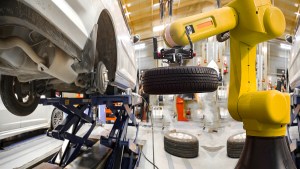Lenten Campaign 2025
This content is free of charge, as are all our articles.
Support us with a donation that is tax-deductible and enable us to continue to reach millions of readers.
“The things you own end up owning you.” – Tyler Durden
While Fight Club‘s imaginary anti-hero’s words may have been metaphorical, there is something chilling about them when considering the BBC’s report that there’s a good chance the majority of human jobs will be performed by machines and AI within the next 120 years:
Katja Grace, a research associate at the University of Oxford’s Future of Humanity Institute, and her colleagues from the AI Impacts project and the Machine Intelligence Research Institute, have surveyed 352 scientists and compiled their answers into predictions about how long it may take for machines to outperform humans on various tasks.

Read more:
Is automation taking our jobs or creating new ones?
The findings speculate that machines could take over menial manual tasks like folding laundry by 2021. This sounds simple enough, but Jeremy Wyatt, professor of robotics and artificial intelligence at the University of Birmingham, explains it’s more complicated than you would think:
“It is one thing doing it in the lab, and quite another having a robot that can do a job reliably in the real world better than a human. “Manipulating physical objects in the real world – figuring out what to manipulate, and how, in a random, changing environment – is an incredibly complex job for a machine.”
He goes on to equate the current development of self-driving cars to that of the primitive internet of the 1990s. Regardless of Wyatt’s skepticism, the research predicts truck shipping routes to be fully automated by 2027.
There are, however, some jobs in which the research claims AI performance would not be accepted by humans — in particular, faith leaders.

